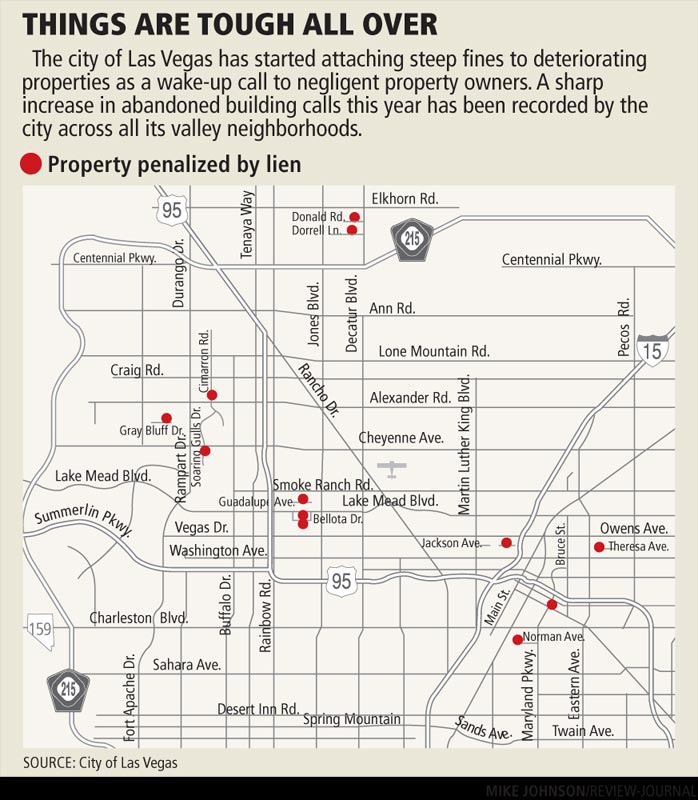LV hopes fines jolt owners
Dedra Edmond knew for a long time that Las Vegas was going to demolish a house and some buildings on Jackson Avenue that had belonged to her family for years.
She also knew that she would get a bill for the destruction of the dilapidated structures.
But as her case was moving through the legal process of notices and appeals for time, the Las Vegas City Council adopted a new policy: assessing civil fines of as much as $500 a day on people with nuisance properties to scare owners into maintaining land and buildings.
Edmond was surprised when she received a notice that said she owed the city about $13,000 for the demolition and cleanup and, potentially, as much as $426,500 in fines. The amount is roughly 23 times the property's documented value.
Edmond did not respond to a request for comment for this story, but she has said previously that she wants to open a restaurant and a print shop on the plot, which is in the heart of historic West Las Vegas.
She pleaded with council members on Oct. 1 not to levy the fines, and they relented, citing the fact that she has been in touch with city officials and is trying to do something with the land.
That has not been the case with other properties across the city. Council members have been unapologetic about the crackdown, especially when owners of the properties in question do not respond to notices.
While city leaders have said it's an effective way to keep blight at bay, others wonder whether the stiff fines do as much harm as good by potentially stigmatizing properties, discouraging sales and becoming a tool for unofficial condemnations.
In the first four months of the current fiscal year, Las Vegas has recorded almost as many abandoned building cases as were filed in all 12 months of the prior fiscal year. The reports are not limited to certain neighborhoods, but they tend to concentrate in the older parts of town.
Foreclosures, the real estate slump and the general economic malaise get the blame as people neglect or abandon properties they are having difficulty affording.
Since July, the council has levied fines totaling more than $1.1 million on 12 properties, and hearings on cleanups take place at just about every City Council meeting.
In other cases, people who owe money for cleanups or who are faced with the possibility of huge fines take care of business before the matter reaches the council.
"People are coming forward," said Devin Smith, the city's neighborhood response manager, to council members at recent meeting.
"I bet they are," Mayor Oscar Goodman responded. "People are not going to let this happen to their property. That's what we want to do: Wake them up!"
It was a rude awakening for Dave Abraham.
He and his partners manage 12 acres just off Decatur in northwest Las Vegas and had deals with a few potential developers fall through. Meanwhile, in 2006, city officials received a report about a gutted and open house on the property and other complaints.
The property was cleaned up and the house boarded, but city inspectors said the house had to come down. Abraham told the City Council that his company could not afford the demolition. According to city records, he said the company was having trouble affording the $870,000 property.
After many notices and phone calls, the city hired a contractor to knock down the house and clean up the property, running up a bill of $10,121 and the possibility of more than $320,000 in civil fines.
Abraham declined to comment for this story, saying he still was working to develop the property. The fines, he told the council, would make it harder to do so.
"We thought we would have a quick turnover," he said last month. "The civil penalties at this point would raise the land prices to the point that we couldn't get rid of it."
Councilman Steven Ross, who represents that part of the city, was unmoved.
"You had an opportunity to take care of this a long time ago," Ross told Abraham. "Getting a loader out there and trashing those buildings would've been a lot cheaper than where we're at today."
Ross relented far enough to reduce the fine to $160,500. Abraham's company, Pay Dirt Development and Investment, also is listed as the owner of an adjacent property that was fined $300,000 for violations.
The fines attach to the properties as liens that must be paid off before the property can be sold.
That raises the possibility of the city taking over the properties, Goodman said.
"It may get to a point where the assessed civil fine is of such magnitude that the owner may say that it doesn't pay to sell it and basically abandons it completely," he said. "We could go and declare it a blight -- hopefully, be able to contact the owner and make a deal. We'll excuse part of the fines if he'll turn the property over to us."
As for the use of the property, "it's speculative at this point," Goodman said. "I always said we could fix them up and then make it into affordable housing."
Kermitt Waters, an attorney who has worked on eminent domain issues, said city officials need to be careful if they keep going down this road.
For one thing, it could make the city the owner of distressed properties. The city could turn a profit on reselling them if the market picks up, "but that's two ifs tied to three maybes," especially if the economic morass gets worse.
The city also should not be tempted to use the fines as a kind of under-the-table condemnation tool, Waters said.
"If it's not, and these are legitimate cases, they can legally do that," Waters said. "But it's the wrong time to be doing it."
Kipp Cooper, director of government affairs for the Greater Las Vegas Association of Realtors, agreed, saying he worried that having properties with fines attached to them would deter would-be buyers.
"I think we're going to see some problems clearing this real estate with these lead balloons attached to them," he said.
"We understand the position the city's in. But there are clearly some policies that contradict their desired effect."
Councilman Steve Wolfson said the city can work with a property owner or would-be buyer to ensure properties do not sit unused.
"We can always renegotiate," Wolfson said. "We can always, in good faith, reduce that lien."
For the city to even say it's a negotiation is "obscene," Cooper said. "That is something that's going to stigmatize the property.
The fact that a property has a lien at all might be too much of a problem, Cooper said. Officials instead should focus efforts on projects such as the recently passed Neighborhood Stabilization Program, he said.
It will direct federal money toward repopulating foreclosed and abandoned properties.
"We want to keep people from walking away from properties, but the horse has left the barn," Cooper said.
Contact reporter Alan Choate at achoate@reviewjournal.com or 702-229-6435.




























